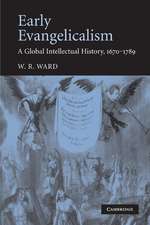The Orphan Scandal: Christian Missionaries and the Rise of the Muslim Brotherhood
Autor Beth Baronen Limba Engleză Paperback – 8 iul 2014
On a sweltering June morning in 1933 a fifteen-year-old Muslim orphan girl refused to rise in a show of respect for her elders at her Christian missionary school in Port Said. Her intransigence led to a beating—and to the end of most foreign missions in Egypt—and contributed to the rise of Islamist organizations.
Turkiyya Hasan left the Swedish Salaam Mission with scratches on her legs and a suitcase of evidence of missionary misdeeds. Her story hit a nerve among Egyptians, and news of the beating quickly spread through the country. Suspicion of missionary schools, hospitals, and homes increased, and a vehement anti-missionary movement swept the country. That missionaries had won few converts was immaterial to Egyptian observers: stories such as Turkiyya's showed that the threat to Muslims and Islam was real. This is a great story of unintended consequences: Christian missionaries came to Egypt to convert and provide social services for children. Their actions ultimately inspired the development of the Muslim Brotherhood and similar Islamist groups.
In The Orphan Scandal, Beth Baron provides a new lens through which to view the rise of Islamic groups in Egypt. This fresh perspective offers a starting point to uncover hidden links between Islamic activists and a broad cadre of Protestant evangelicals. Exploring the historical aims of the Christian missions and the early efforts of the Muslim Brotherhood, Baron shows how the Muslim Brotherhood and like-minded Islamist associations developed alongside and in reaction to the influx of missionaries. Patterning their organization and social welfare projects on the early success of the Christian missions, the Brotherhood launched their own efforts to "save" children and provide for the orphaned, abandoned, and poor. In battling for Egypt's children, Islamic activists created a network of social welfare institutions and a template for social action across the country—the effects of which, we now know, would only gain power and influence across the country in the decades to come.
Turkiyya Hasan left the Swedish Salaam Mission with scratches on her legs and a suitcase of evidence of missionary misdeeds. Her story hit a nerve among Egyptians, and news of the beating quickly spread through the country. Suspicion of missionary schools, hospitals, and homes increased, and a vehement anti-missionary movement swept the country. That missionaries had won few converts was immaterial to Egyptian observers: stories such as Turkiyya's showed that the threat to Muslims and Islam was real. This is a great story of unintended consequences: Christian missionaries came to Egypt to convert and provide social services for children. Their actions ultimately inspired the development of the Muslim Brotherhood and similar Islamist groups.
In The Orphan Scandal, Beth Baron provides a new lens through which to view the rise of Islamic groups in Egypt. This fresh perspective offers a starting point to uncover hidden links between Islamic activists and a broad cadre of Protestant evangelicals. Exploring the historical aims of the Christian missions and the early efforts of the Muslim Brotherhood, Baron shows how the Muslim Brotherhood and like-minded Islamist associations developed alongside and in reaction to the influx of missionaries. Patterning their organization and social welfare projects on the early success of the Christian missions, the Brotherhood launched their own efforts to "save" children and provide for the orphaned, abandoned, and poor. In battling for Egypt's children, Islamic activists created a network of social welfare institutions and a template for social action across the country—the effects of which, we now know, would only gain power and influence across the country in the decades to come.
| Toate formatele și edițiile | Preț | Express |
|---|---|---|
| Paperback (1) | 172.04 lei 3-5 săpt. | |
| Stanford University Press – 8 iul 2014 | 172.04 lei 3-5 săpt. | |
| Hardback (1) | 645.98 lei 6-8 săpt. | |
| Stanford University Press – 8 iul 2014 | 645.98 lei 6-8 săpt. |
Preț: 172.04 lei
Nou
Puncte Express: 258
Preț estimativ în valută:
32.92€ • 34.08$ • 27.83£
32.92€ • 34.08$ • 27.83£
Carte disponibilă
Livrare economică 12-26 februarie
Preluare comenzi: 021 569.72.76
Specificații
ISBN-13: 9780804791380
ISBN-10: 0804791384
Pagini: 272
Ilustrații: black & white illustrations, maps
Dimensiuni: 152 x 229 x 18 mm
Greutate: 0.38 kg
Editura: Stanford University Press
Colecția Stanford University Press
ISBN-10: 0804791384
Pagini: 272
Ilustrații: black & white illustrations, maps
Dimensiuni: 152 x 229 x 18 mm
Greutate: 0.38 kg
Editura: Stanford University Press
Colecția Stanford University Press
Recenzii
"Beth Baron has written a remarkable book . . . Engaging with a broad array of multilingual sources, Baron crafts a truly transnational narrative about the missionary encounter in semi-colonial Egypt."—Barbara Reeves-Ellington, Social Sciences and Missions
"[T]he discussion is scholarly and tries to give voice to all parties, specific examples and narrative help humanize the issues, thus making them approachable both intellectually and emotionally. Impressively researched and very readable."—Muhammed Hassanali, Booklist
"Baron deftly examines the convoluted legal and political maneuvers during this incident, as well as the varied methods by which Turkiyya, her missionary opponents, and other Egyptians raised and constructed ideas of gender . . . [T]his is a great read . . . Summing Up: Highly Recommended."—J. M. Rich, CHOICE
"Transnational history at its best, The Orphan Scandal exemplifies the powerful stories that emerge as missionary sources are skillfully woven together with host culture sources. A compelling history of the relationship between missionaries and the rise of the Muslim Brotherhood in twentieth-century Egypt."—Kathryn Kish Sklar, SUNY Binghamton
"Beth Baron tells a dramatic story about Western missionary fantasies to convert the Middle East and about a variety of Muslim Egyptian responses to these missionary fantasies. She charts the major unintended consequence of this missionary project, namely the emergence of the Muslim Brotherhood movement and the rise of the Muslim welfare state in Egypt. Beautifully narrated, and drawing on both Arabic and English-language sources, Baron humanizes all sides of the missionary encounter in Egypt. This is an important book."—Ussama Makdisi, Rice University
"A brilliant book essential for today's audiences. Beth Baron has identified a powerful incident that galvanized the Muslim Brotherhood and fundamentally altered the place of Western missionaries and officials in Egypt."—Robert L. Tignor, Princeton University
"A brilliant book essential for today's audiences. Beth Baron has identified a powerful incident that galvanized the Muslim Brotherhood and fundamentally altered the place of Western missionaries and officials in Egypt."—Robert L. Tignor, Princeton University
Notă biografică
Beth Baron is Professor of History at City College and Director of the Middle East and Middle Eastern American Center at The Graduate Center, CUNY. She is the author of Egypt as a Woman: Nationalism, Gender, and Politics (2005) and The Women's Awakening in Egypt: Culture, Society, and the Press (1994).
Descriere
Following the story of the Port Said orphan scandal, this book uncovers hidden links between Protestant evangelicals and the growth of Islamist groups in Egypt.
















